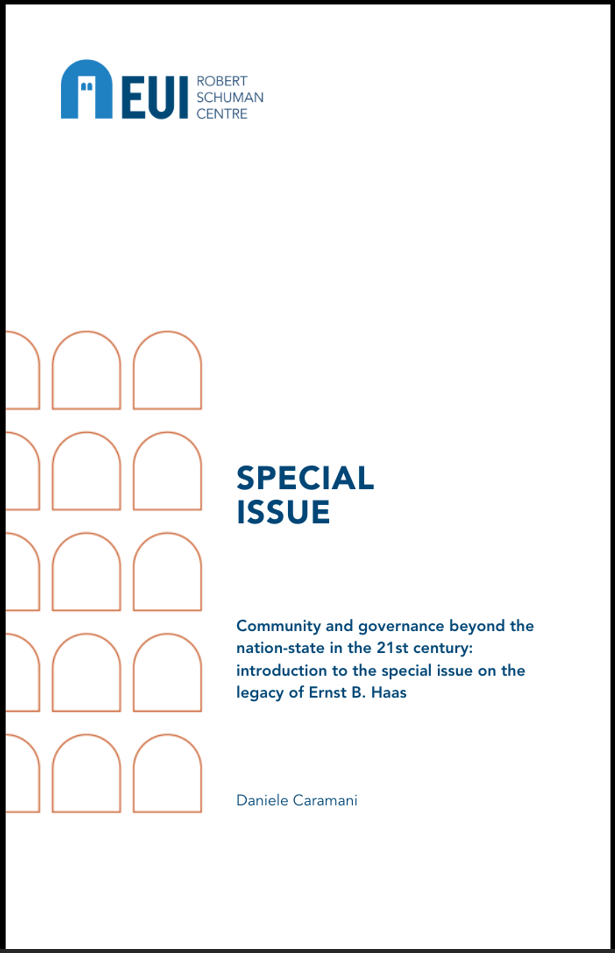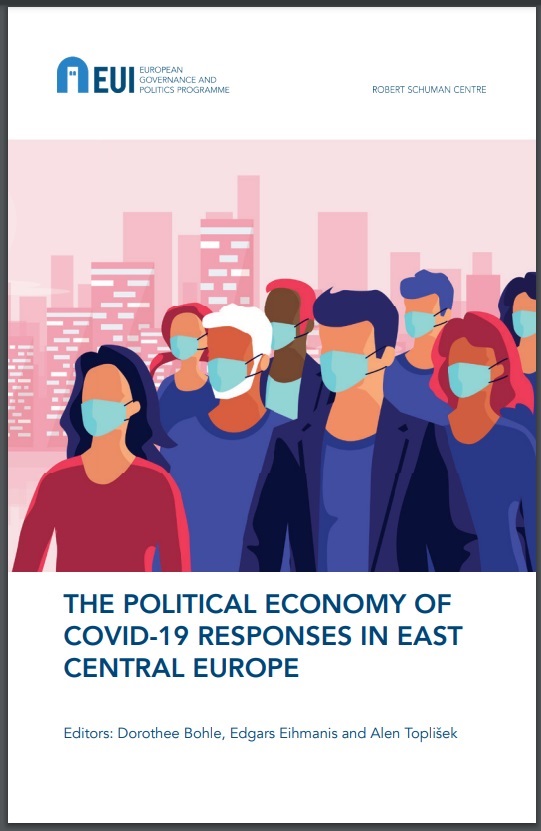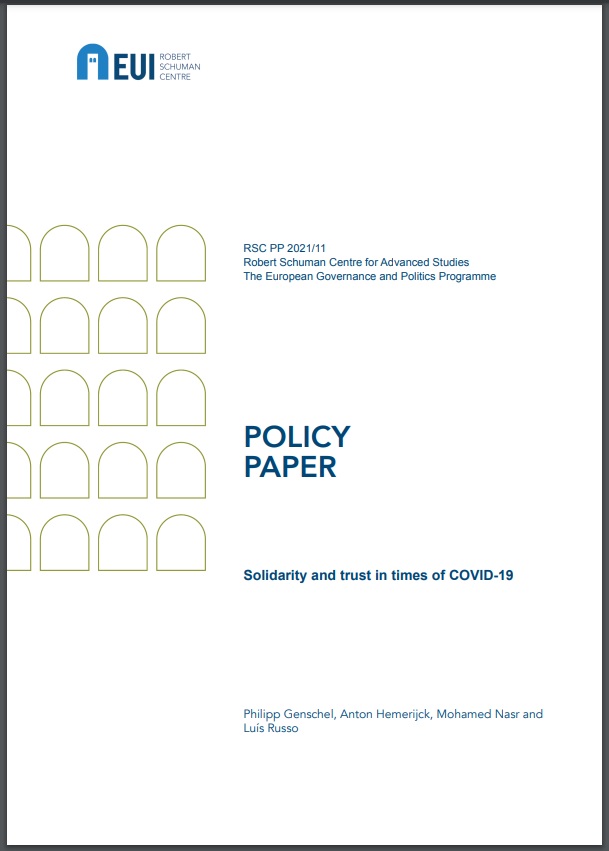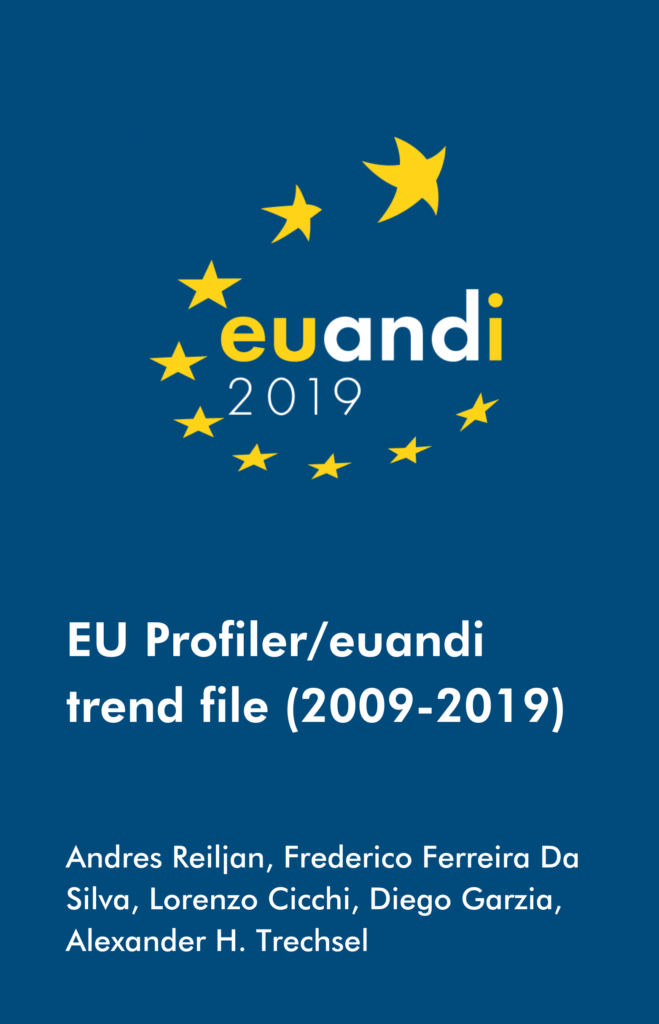Research at EGPP fosters the publication of research in a variety of outlets:
- Monographs and edited volumes;
- Articles in refereed academic journals;
- In-house publications such as the EGPP Working Papers Series, the EGPP Policy Briefs and the special editions EGPP Policy Papers. Inquiries about paper submissions to these series should be addressed to Daniele.Caramani@eui.eu. Acceptance in the series is conditional on an open internal review process.
In addition, EGPP constitutes a platform for datasets to support research on European politics.
Community and governance beyond the nation-state in the 21st century: introduction to the special issue on the legacy of Ernst B. Haas
Daniele Caramani, 2024
Ernst B. Haas was a leading authority on international relation theory who pioneered the fields of European integration and supra-national governance. This Special Issue re-evaluates the significance of his work for the present time and explores lesser known research areas opened by the founder of neo-functionalism. Read more…
The political economy of COVID-19 responses in East Central Europe
Edited by BOHLE, Dorothee Bohle, Edgars Eihmanis and Alen Toplišek, 2022
This volume asks two questions: first, how have states in the region attempted to mitigate the socioeconomic effects of the COVID-19 crisis, and second, whether they have attempted to build up resilience to external shocks. Based on a number of case studies, the volume provides a comparative picture of the responses to the COVID-19 crisis in East Central Europe. Read more…
Solidarity and trust in times of Covid-19
Philipp Genschel, Anton Hemerijck, Mohamed Nasr, Luís Russo, 2021
How did one year of COVID-19 affect trust and solidarity in the EU? This report draws on new evidence collected by a survey fielded in April 2021 across 13 EU countries and the UK to assess it. While trust in other people and institutions did not collapse, it is still soberingly low and declining. People are generally less solidaristic in 2021 than in 2020.
Read more…
EU Profiler/Euandi Trend File (2009-2019)
Andres Reiljan, Frederico Ferreira Da Silva, Lorenzo Cicchi, Diego Garzia, Alexander H. Trechsel, 2020
The EU Profiler/euandi Trend File (2009-2019) is a dataset combining party position data from three pan-European voting advice applications (VAAs), developed for the European Parliament elections in 2009, 2014 and 2019. It includes the positions of over 400 parties from the 28 EU member states on a wide range of salient political issues. Read more…
Catalogue
Browse the catalogue of all publications and datasets below.
National mini-public report : Italy
- Type: Technical Report
- Year of Publication: 2024
- Series/Report no.: Research Paper, 2024/11, REGROUP, [Mini-publics], [European Governance and Politics Programme]
- Abstract: This report provides an overview of the Italian mini-public on knowledge communication, disinformation, the role of experts, and trust in politics during the Covid-19 pandemic, which was held in the [...]
The reliefâreform divide : an analysis of national responses to Covid-19 in seven EU member states' recovery plans
- Type: Technical Report
- Year of Publication: 2024
- Series/Report no.: Research Paper, 2024/10, REGROUP, [European Governance and Politics Programme]
- Abstract: This research paper explores the ârecovery divideâ in the distribution of funds from Next Generation EUâs the Recovery and Resilience Facility (RRF). The RRF, the central and largest component of [...]
The evolution of global cleavages : a historical analysis of territorial and functional world alignments based on automated text analysis, 1843â2020
- Type: Working Paper
- Year of Publication: 2024
- Series/Report no.: EUI, RSC, Working Paper, 2024/07, ERC Advanced Grant GLOBAL, European Governance and Politics Programme
- Abstract: This paper examines the global cleavages that structure world politics from the mid-19th century to the present. It develops the concept of cleavage applied at the global level and measures [...]
Learning from adversity: towards a European Union of social investment welfare states
- Type: Other
- Year of Publication: 2023
- Series/Report no.: EUI, RSC, Policy Brief, 2023/08, European Governance and Politics Programme
- Abstract: This policy brief reconstructs the process of welfare recalibration across EU welfare states in response to the Great Recession and the COVID-19 health shocks. It brings out four important lessons. [...]
Exposure to democracy and MEPs attitude toward EU integration
- Type: Working Paper
- Year of Publication: 2023
- Series/Report no.: EUI, RSC, Working Paper, 2023/72, The European Governance and Politics Programme
- Abstract: This paper analyzes the effect of exposure to democracy during adolescence and early adulthood on the pro-EU attitude of the members of the European Parliament. Relying on the psychological theory [...]
The health-economy divide : a structural analysis of sectoral affectedness and Covid-19 policy preferences in Europe
- Type: Technical Report
- Year of Publication: 2023
- Series/Report no.: REGROUP, Research Paper, 2023/03, [European Governance and Politics Programme]
- Abstract: The Covid-19 health emergency and the resulting economic crisis hit European societies asymmetrically, which led to divergent preferences over the policies addressing the emergency. This paper analyses how different economic [...]
Shared identity in crisis : a comparative study of support for the EU in the face of the Russian threat
- Type: Working Paper
- Year of Publication: 2023
- Series/Report no.: EUI, RSC, Working Paper, 2023/48, The European Governance and Politics Programme, [Migration Policy Centre]
- Abstract: Social identity theory suggests that an external threat, such as the Russian invasion of Ukraine in 2022, can increase identification with a group and foster a shared sense of identity. [...]
Who lends the EU the âright to governâ?: symbolic legitimacy vs. pragmatic policy framing in party communication during the Covid-19 pandemic
- Type: Working Paper
- Year of Publication: 2023
- Series/Report no.: EUI, RSC, Working Paper, 2023/35, The European Governance and Politics Programme
- Abstract: The Covid-19 crisis as an extreme case of politics was a formidable real-world test for the legitimacy of the EU as decision-making arena. The debate about party political politicisation in [...]
Party placement in the void : the European political space in 10 years of cross-national voting advice applications
- Type: Working Paper
- Year of Publication: 2023
- Series/Report no.: EUI, RSC, Working Paper, 2023/20, European Governance and Politics Programme
- Abstract: With this paper, we pay tribute to Peter Mair by looking back at the three waves (2009, 2014, 2019) of the pan-European Voting Advice Application (VAA) EU Profiler/euandi â a [...]
EP election results at constituency Level (1979-2019)
- Type: Dataset
- Year of Publication: 2023
- Series/Report no.: EUI Research Data, 2023, Robert Schuman Centre for Advanced Studies, [European Governance and Politics Programme]
- Abstract: This project makes available a collection of all results for the elections to the European Parliament since its first direct election in 1979 at the level of single constituencies for [...]
Publications: 10/179




